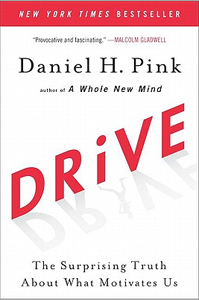Mike Sweet
Recent Posts
#SOTU: President Obama Says that Americans “May have to Retool and Retrain”
Current Events, Information Literacy, Timely Topics, Uncategorized
Why am I learning this? That’s a question that pops into students’ heads like a refrain throughout their education, something I’m sure we all asked ourselves, our teachers, or our parents at some point. Sometimes we were given a good answer that helped engage us in the lesson that day; sometimes (and I’m looking at you, quadratic equation) we’re still not sure.
Autonomy, Mastery and Purpose: How Daniel Pink’s "Drive" Motivates Me
According to recent Gallup study, businesses with high levels of employee engagement are 21% more productive and 22% more profitable than those with low employee engagement.
The Four Skills Most Recent Grads Don't Possess -- But Should
Bloomberg Business surveyed recruiters at hundreds of companies to ask them what skills they sought in candidates, and whether they saw those skills in the people applying for jobs. Bloomberg is using the responses to rank business schools, but I think there is a point worth looking at on a much broader scale: higher education has been slow to adapt to the new demands of work in the twenty-first century.
Do Colleges and Universities Really Teach Higher-order Thinking?
I recently authored a piece in eCampus News about the skills gap employers like myself have noticed in recent graduates, how this is stunting their career prospects and undermining the value of a college education.
Education, Information Literacy, Information Literacy Courseware, Uncategorized
“What ‘Learning How to Think’ Really Means”: A CEO’s Response
Barry Schwartz’s recent Chronicle of Higher Education article, “What ‘Learning How to Think’ Really Means,” should be required reading for anyone wading into the debate about the state of higher education in the US. With articulate prose, he argues in favor of a system that simultaneously teaches students the skills that will be of greatest benefit to their professional lives, but also develops the virtues that will make them decent human beings and citizens with whom we can be proud to work and live. He draws clear connections between these virtues and long-term career success, arguing that it is actually these virtues that often truly differentiate people in the world of work.
An ongoing study by Northeastern University found that American business leaders are hesitant to endorse Higher Ed’s preparation of graduates to enter the workforce. On what did these same business leaders place a high priority? Creativity and problem-solving skills.
I started this series of blog posts to share some of the experiences I’ve had as the CEO of Credo. We’re a small company –roughly 60 people – that has experienced steady growth and tripled in size over the last seven years. Our products and services are sold worldwide to libraries of all types. We started by providing a database full of reference content from the world’s best publishers. In 2008, we began to expand our products and services in an effort to widen our appeal beyond libraries and into the world of learning more generally. Our mission is focused on helping learners develop the information skills necessary to succeed in the knowledge economy.








